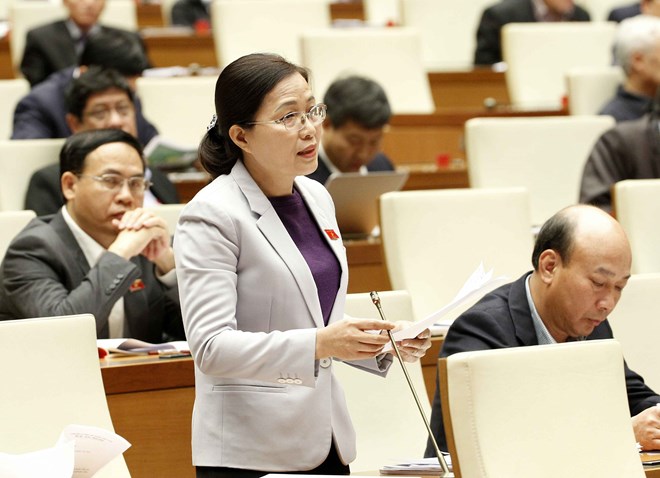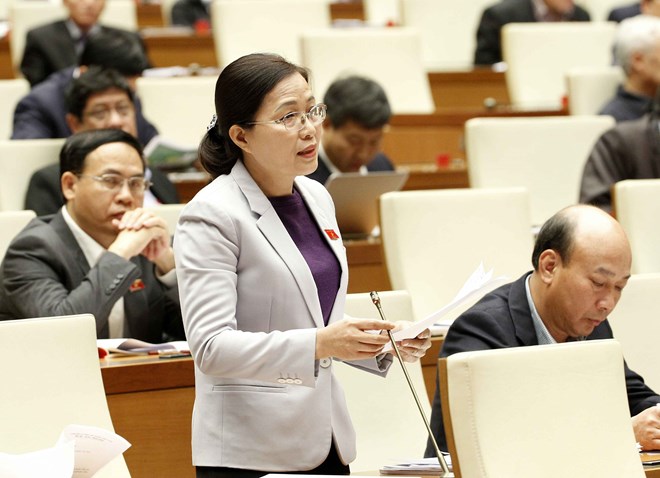
Lawmakers voiced support for appointing a single chief to run each special administrative-economic unit, instead of setting up People’s Councils and People’s Committees, while discussing a draft law on such units on November 22.

Deputy Do Thi Lan of Quang Ninh
province speaks at the the National Assembly's discussion on November 22
(Photo: VNA)
The Government decided to develop three special administrative-economic units -
Van Don in northern Quang Ninh province, Bac Van Phong in central Khanh Hoa
province, and Phu Quoc Island in southern Kien Giang province.
National Assembly (NA) deputies agreed on the need to issue the law, adding
that to create breakthrough development for these special zones and to ensure
their competitiveness, the law could stipulate preeminent mechanisms and
policies different from existing laws.
However, any differences need to conform with the Constitution while ensuring
defence-security and the rights of local residents, they noted.
One option proposed in the draft law is to not establish People’s Councils and
People’s Committees in the special units. Instead, the Prime Minister would
appoint chiefs of these zones, and they would have authority to decide and
organise all administrative and socio-economic activities in their respective
units.
The other option is organising local administrations comprising People’s
Councils and People’s Committees, as per normal localities.
A number of deputies supported the first option, saying that it creates a
special apparatus for the special units’ administration.
Deputy Thach Phuoc Binh from Tra Vinh province advocated the appointment of
chiefs of special administrative-economic units, noting that self-reliance and
self-management are the soul of special administrative-economic units. However,
he did point out the draft mechanism to control the power of the chiefs is
vague and needs to be detailed.
Meanwhile, deputy Nguyen Thai Hoc from Phu Yen province noted the selection of
the chiefs would be crucial, as success or failure depends on personnel work.
The mechanism for selecting the chiefs must be open and transparent so as to
choose capable and visionary leaders.
Nguyen Thi Le Thuy, a legislator representing Ben Tre province, said the
apparatus of the special units’ as the first option will help pilot reforms and
be in line with some international practices.
Deputy Pham Van Hoa from Dong Thap province said in the first option, although
the chiefs are given authority, they are bound by too many restrictions. They
would be monitored by provincial People’s Councils and provincial committees of
the Vietnam Fatherland Front, and report to chairpersons of provincial People’s
Committees when necessary.
Therefore, he supported the second option, which is setting up People’s
Committees and People’s Councils in the special administrative-economic units,
but adding that the power of these agencies should be streamlined.
The discussion was part of the ongoing fourth session of the 14th NA in Hanoi.
Source: VNA
In the spirit of "Party members go first, the people follow”, all households of Party members in the Doan Ket sub-region in Da Bac town, Da Bac district, voluntarily removed gates and fences, and donated land when the road expansion project passed through their properties. Inspired by their example, 68 households in the sub-region quickly followed suit, contributing over 1,400 sq.m of residential and perennial cropland to widen the main road through the residential area. The exemplary role of Party members in Doan Ket stands as a shining example of studying and following President Ho Chi Minh’s thought, morality, and lifestyle.
The Hoa Binh provincial People's Committee held a monthly meeting on May 29 to assess the implementation of socio-economic development tasks in the first six months of 2025, the progress of key projects, and some other important issues.
During his lifetime, President Ho Chi Minh always expressed his deep affection and special concern for children and youth. He once emphasized: "Caring for and educating children well is the responsibility of the entire Party and the entire people”; "First of all, the family (i.e. grandparents, parents, siblings) must do this job well”. "the Party Committees…, the Children’s Committee, the Youth Union, the education sector, and all related organizations must have specific plans to ensure children grow healthier and more progressive”. His teachings has been remaining valuable and serving as the guiding principles in the work of protecting, caring for, and educating children. In line with this ideology, Hoa Binh Province has continuously been prioritizing and investing resources in the well-being of children in recent years.
Mr. Nguyen Phi Long, the alternate Member of the Party Central Committee and Secretary of the Provincial Party Committee chaired the meeting of the Standing Committee of the Provincial Party Committee to provide opinions on several investment projects within the province. There was the attendance of Ms. Bui Thi Minh, the Permanent Deputy Secretary of the Provincial Party Committee and Chairwoman of the Provincial People’s Council; Mr. Bui Đuc Hinh, the Deputy Secretary of the Provincial Party Committee and Chairman of the Provincial People’s Committee and other members of the Standing Committee; the leaders from other departments, agencies, and some localities.
The Standing Board of the Vietnam Fatherland Front (VFF) Committee of Hoa Binh province held a meeting on May 28 to honour outstanding village elders, village heads, and reputable individuals from local ethnic minority and religious communities.
In mid-May, the provincial Museum organised an exhibition named "Duoi la co Dang Cong san Viet Nam quang vinh” (Under the flag of the glorious Communist Party of Vietnam). This meaningful activity took place in the joyful atmosphere to celebrate the country's major holidays and the Party congresses at all levels for the 2025-2030 term, towards the 14th National Party Congress.



